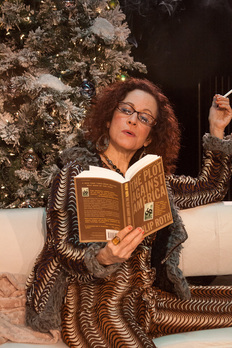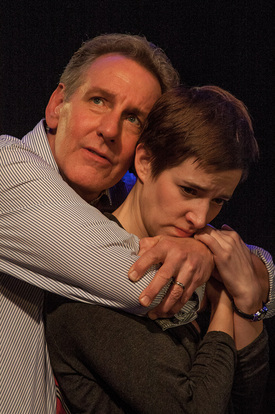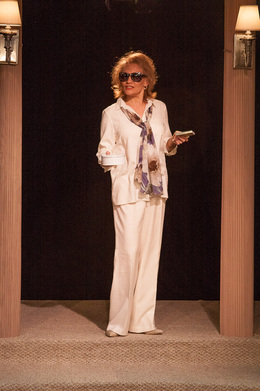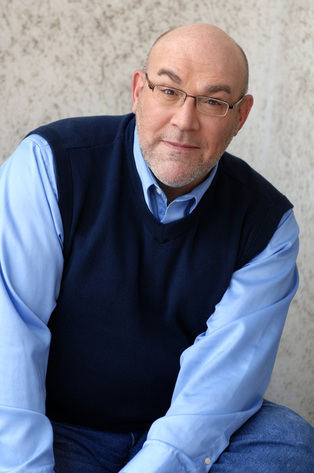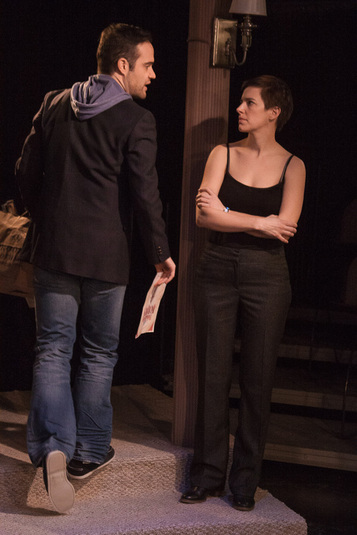
Eva Gil: I think it touches on how we talk about and process our past and the narratives we tell ourselves. It touches on how family dynamics play into that narrative and the struggle between children and their parents carving out their own story lines. Ultimately, I think it is a story of love, growth and the power of truth.
Justin D. Quackenbush: I'm still making new discoveries about the properties that make this piece fly. I could summarize the events of the play but it's the thematic subtext that is the most captivating - and that can only be truly appreciated by attending the show. There are choices, secrets, divergent memories, politics, polemics, confusion, compassion, Christmas and sarcasm. Leaving it at that is a bargain-basement inventory of the richness in Jon Robin Baitz's writing and Mark Alan's direction.
Do you have trouble keeping secrets?
Justin: One of my absolute favorite moments in theater is near the end of Gypsy when Louise says: "My mother, who got me into this business, always told me, 'Make them beg for more and then, don't give it to them!' But I'm not my mother" I do have secrets and I am good at keeping them. Nothing sordid or malicious but an artist must hold his cards close to his breast, that way when he plays the winning hand it's a surprise to the audience.
Eva: I am terrible with surprises that I am intending to keep secret: if I buy someone a gift I end up telling them I got them something and give it to them early because I can't stand the suspense. However, I'm good with a secret someone tells me!
What character do you play?
Eva: I play Brooke, the daughter who has come home for Christmas and has news to share about her upcoming book. She is sarcastic, conflicted, smart, and probing. As the middle child I think she is constantly trying to find and reconfigure her role within the family dynamic, especially with the passage of time and the way events from their past alter the dynamic.
Justin: I play Trip Wyeth, the total L.A. boy, pioneer of burgeoning reality-TV, pop-culture virtuoso, and mildly bratty baby of the family. He is 150% invested in pursuing the picture perfect Christmas and when things go astray, he is the voice of reason in all his admittedly-flawed glory. He loves his family more than anything, but struggles with how far he'll descend into a lot of drama that he feels belongs in the past.
Can you relate to this family?
Justin: Absolutely - but that's really not so unique to me. "Other Desert Cities" has joined the ranks of many family dramas that define the American Theatre lexicon. There's a reason we will go see "August: Osage County," "The Glass Menagerie," or musicals like "Next To Normal" in any incarnation. We even gravitate towards British works like "The Homecoming." Putting the construct of the family - the more flawed the better in this case - under the microscope is something everyone can identify with. It's that thing that makes theatre magic: it presents the audience with a mirror and in the best cases - like with "Other Desert Cities" - it screams LOOK AT YOU!
Eva: I can relate to the way the siblings are shown to have very distinct roles in the family and how the relationships with their parents are unique to each child. I also love the way the siblings in this play are so frank with each other. I can relate to the camaraderie between the family members even when they don't agree on everything.
What's your favorite line in the play?
Justin: There are many deliciously biting remarks made in this piece that are so satisfying to hear my cast-mates say as well as to deliver. Trip often drips with the type of sarcasm one employs when the truth is the heaviest and my ears perk up every time I hear Silda's remark: "Telling the truth is a very expensive hobby." I like that. People often cite: "The truth shall set you free," and I think a fitting addendum is: but the journey to freedom will be exhausting.
Eva: "Life is chemical. And a chemical reaction happens when two people get together..."

